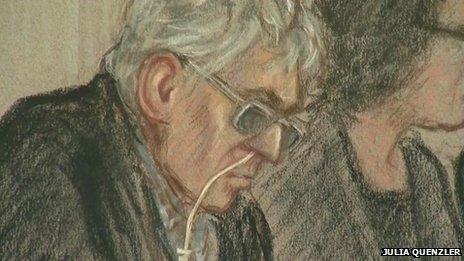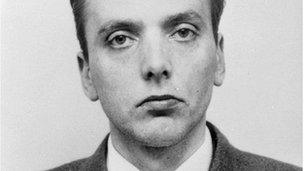Moors Murderer Ian Brady at mental health tribunal
- Published

Sketch of Ian Brady: The tribunal was relayed to a public hearing by a video link
Moors Murderer Ian Brady has appeared in public for the first time in decades, at a hearing considering his sanity as he seeks to end his own life.
Brady, 75, has been on hunger strike since 1999, but is being fed by tube at Ashworth Hospital, Merseyside.
He claims he faked psychotic episodes and wants the mental health tribunal to allow a move to a prison in Scotland.
He and girlfriend Myra Hindley murdered five children in the 1960s, burying some on moors in Greater Manchester.
The tribunal is being held in Ashworth and relayed by video to Manchester Civil Justice Centre, where the public and press are able to observe proceedings.
BBC home affairs correspondent Dominic Casciani tweeted, external a description of Brady "sitting in court wearing dark glasses, curly/wavy grey hair. He's got a feeding tube. He speaks with a very soft voice".
Brady was sitting between two female members of his legal team at the hearing.
Judge Robert Atherton stressed that the tribunal would not consider Brady's crimes or the whereabouts of the body of missing victim Keith Bennett.
Brady's current state of mental health was the only matter being considered, he said.
Forensic psychiatrist Dr Cameron Boyd gave the hearing an outline of what was said during four interviews he conducted with Brady in recent months.
When asked about his crimes, Brady had said that "in some way his behaviour was petty compared to politicians and soldiers in relation to wars", said Dr Boyd.
He added that Brady had denied being psychotic and said he had been "acting".
'Fairly solitary'
Sectioned under the Mental Health Act, Glasgow-born Brady has continued to be tube-fed during years of refusing food.
He wants to be judged sane by the tribunal and moved to a prison in Scotland, where there is no precedent for feeding a prisoner on hunger strike against his will.
The hearing heard that Brady had a "fairly solitary existence", with watching TV and writing letters his main activities.
Another expert witness, Dr Adrian Grounds, was called to give evidence about the mental health notes made about Brady since he was first jailed in the 1960s.
He said Brady has "spoken on a number of occasions about wanting to go to prison so he would be able to die".

Brady and Myra Hindley were jailed for life in 1966
He said there had been "very occasional" but "striking" episodes in the past where Brady appeared to be hallucinating, including in February this year.
But Dr Grounds said Brady claims to have learned how to simulate psychotic episodes while working as a cleaner in prison.
He said in the 1980s Brady displayed mental illness with psychotic symptoms but evidence of psychosis was "equivocal" and he had not "reached the threshold for compulsory treatment".
Dr Grounds added that, in his opinion, Brady has a very severe personality disorder, describing it as "paranoid narcissistic".
He said it was "characterised by superiority, self-centredness, contempt, hostility."
Questioned by Eleanor Grey QC, representing Ashworth Hospital, Dr Grounds said he did not accept its view that Brady had schizophrenia.
The high-security hospital is against Brady being transferred back to prison and Ms Grey said since 1967 medical experts had expressed "concerns" that he was suffering from psychotic symptoms, possibly since his teens.
The tribunal at Ashworth had been due to take place about a year ago but was postponed because Brady was too ill to attend.
It is scheduled to last about eight days, with the judgement then due to be reserved to a later date.
Brady and Hindley tortured and murdered five children aged from 10 to 17, burying some of their victims' bodies on Saddleworth Moor.
They were convicted and jailed for life in 1966. Hindley died in prison in 2002, aged 60.
- Published13 June 2013
- Published17 June 2013
- Published18 August 2012
- Published17 August 2012